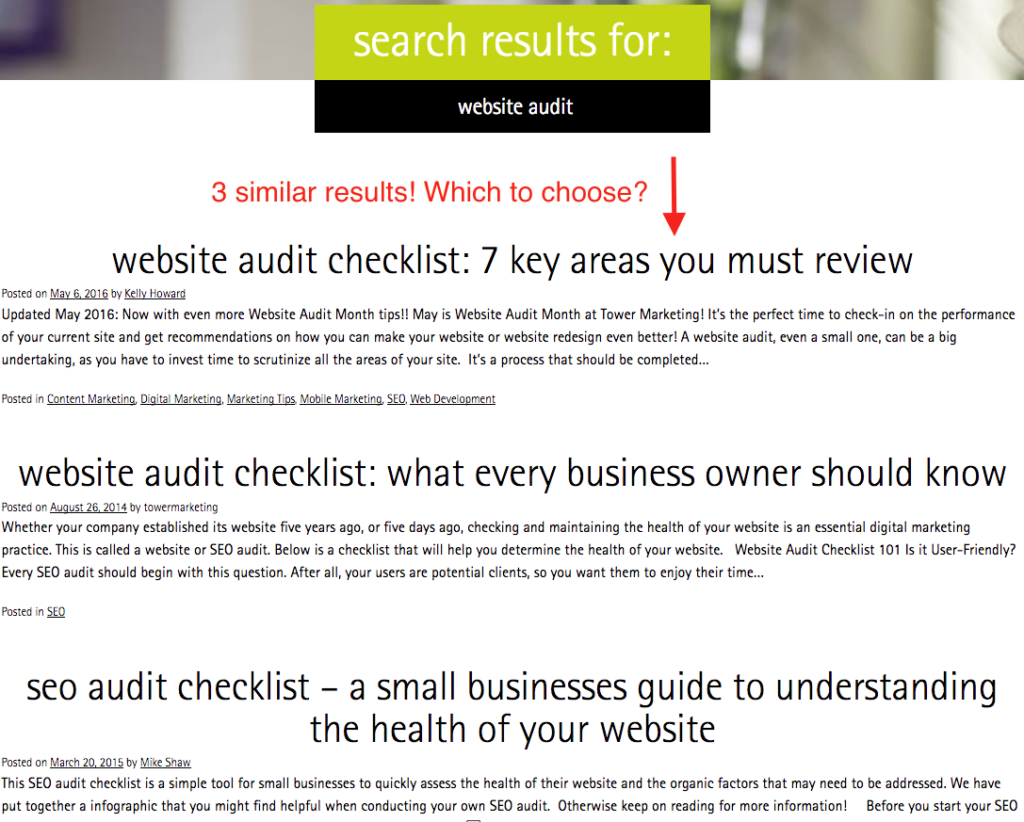Slim Down Your Website’s Pages – Get Rid Of The Bloat
- Content Marketing
- SEO

To carry on the theme of spring cleaning, I am going to talk about cleaning up your site and how to get rid of the bloat that may be costing you visits and leads. If you publish content on a regular basis, such as blog posts, podcasts, or videos, your site will inevitably grow over time. Too much content can clog up the system making it difficult for search engines to know which piece of content to deliver to the user. As your site grows, it is highly suggested that you identify the content that is not performing well or that is not helping your visitors. The main emphasis here is keeping the quality content and removing the junk.
A Real World Example

In Tower’s case, we have covered the topic of website audits three times over the last three years. In all honesty, we don’t need three blog posts about website audits, just one will do. Therefore it was my task to find the website audit pages and compare them in terms of content value, usefulness, the amount of traffic they drive, their page authority, and links back to those pages. Once I found the page that I believed to be of the most value I had a couple of options, either:
- no-index the pages that don’t perform as well
- 301 redirect the lesser quality pages to the more valuable page
- Create a new “super” page and redirect the other website audit pages to the new URL
In this case, I chose to 301 redirected the under-performing pages so that their equity would be passed onto the main website audit blog post that we wanted to promote. Let’s dig into more detail about how to do this.
Is There Such a Thing as Too Much Content?
Yes, websites can become very bloated with low-quality content that is not performing as well as other similar content pieces. When users came to the Tower website and searched for “website audit” they found at least three different results, all of which are very similar. This meant the users needed to choose which post to view, guessing at which one was most applicable to their needs. This can negatively affect the user experience. It is far better to have one result for the website audit topic. Users no longer need to make a choice, allowing them to click through more confidently
When to Delete
In some cases, when reviewing your content, it may be best to simply to delete older pages that have been added over the years. Content like old event pages, coupons that have expired, or blog posts that are outdated, incorrect or no longer apply are low-hanging fruit. Ultimately you only want pages that are applicable and offer value to the user. If a page no longer does that, you may want to consider deleting it. Note: When you delete pages, you need to 301 redirect the users to an appropriate page, otherwise it will cause your site to have broken links.
When to Consolidate
In some cases, as with the Tower Marketing example where we had three similar blog posts, it may be worthwhile creating a new page that has all the best elements of each individual page, called a “super page.” The goal here is to create a unique, high-quality piece of content that does not outdate itself and can be easily updated. Note: Doing this would require a 301 redirect to point the three older pages to the new super page.
When to Noindex
If you don’t know which pages to delete and redirect, another option would be to noindex the pages. While this does not help with duplicate content issues on your site, it can help search engine to not index a group of similar pages on the web. Tags and Categories are examples of URL extensions that we at Tower noindex because they can bloat the search results and cannibalize the rankings of pages that are more relevant. Note: Noindex still allows the bots to visit that page, they will however not be added to the SERPs.
Benefits of Cleaning Up Your Site
Cleaning up your site has several advantages, one of which is making the articles that are most important to users easy to find. Web designers and SEO’s need to work together to make sure that UX (user experience) is maintained. As mentioned earlier, having multiple search results for the same query can hinder the user journey and UX. When you clean up your site it also allows for better search results. A clean site makes it easier for search engines to index and categorize which page best represents a user’s search query. As noted above, having one super page instead of three can help rankings.
Ready to slim down your website? Contact our specialists today to start the cleanup process.
 Kimmick
Kimmick  Gillian
Gillian